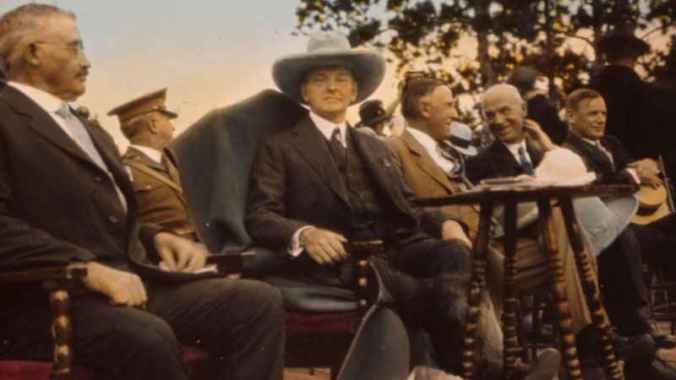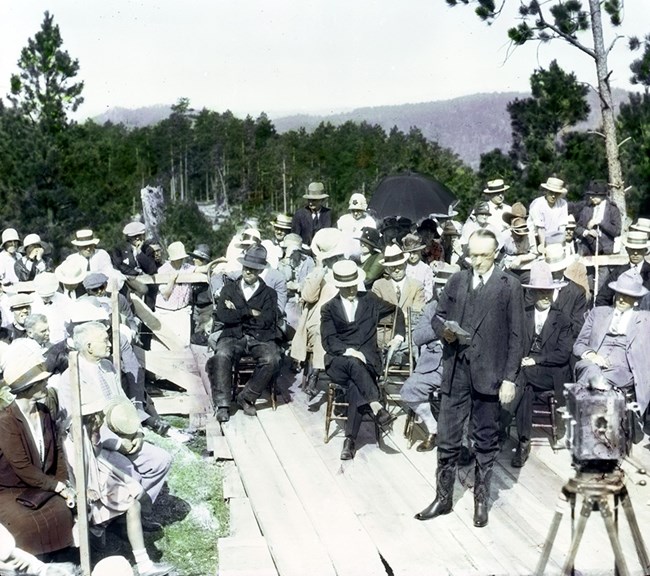It is a testament to the vision of our Framers that a unitary executive, as opposed to a board of legislator-kings, was the model adopted for these United States. It infused the office with not only an individual’s energy but also a personal restraint, resting on the judgment of the one who presides where no one else can. It remains in the care taken by those choosing that officer of our Republic along with the caliber and quality of the man himself whether the burden of responsibility is well suited or poorly matched. Above all, the President must preside. If he fails to do that, he has failed the American people.
Though 45 men have served, we offer a list below of its first 40 to compare the similarities (both major and minor) shared with #30 in the series, President Calvin Coolidge.

President Coolidge at the dedication of Mount Rushmore, August 10, 1927. Courtesy of NPS, Mount Rushmore National Memorial.
Coolidge is underrated and largely unknown today not because he somehow merited the infamy or did nothing of significance…He actually did quite a lot in his five and a half years in office. He is discounted today because he challenges each American (for him it made no difference the color, the country of origin, or the economic bracket) to do something uncomfortable and downright difficult: to summon a higher citizenship and loftier principles worthy of the country’s blessings. He expects more than we all too often have expected of ourselves. He does this because he knows we are capable of better than what we apathetically settle for personally and politically. He long ago saw through the lie that individuals can do nothing to shatter the way things are. He refused waste in all its forms, including the wasteful mentality that life is merely a “lottery” and everyone else is to blame for your failure to win it. Raised closer to realities than many of us have ever known, Coolidge did not learn these truths from college. He learned them from his own daily experiences on the land, with his family’s stock, and watching their unapologetic example. He first learned character by seeing character at work.
Those who have presided over the Executive Branch in our constitutional system possess a host of colorful examples, good and bad. With Coolidge, it proved a wiser choice than anyone could have realized…primarily because he first succeeded to office on the unfortunate death of his predecessor. Selected for his own worth, the following year, however, Coolidge demonstrated powerfully that the complexities of national leadership had not outgrown the competency of the Framers’ original design. It still worked and he made it look easy: a unitary executive entrusted to preside in office according to his solemn oath, faithfully executing the laws adopted not by some elected royal family nor by a class of those born to govern from Washington. On the contrary, he held office faithfully executing laws passed and granted legitimacy by the people themselves. If the people of the country are disengaged and ambivalent, it will manifest in those they choose to represent them. If the people lack regard for the moral force behind law, the obedience that makes all good things possible, no government can feel it for them. Without that reverence for where laws obtain and secure their validity, no authority on earth can stand.

Photo by Charles D’Emery. Courtesy of NPS, National Park Service.
And so, our list comparing Coolidge with thirty-nine of our Presidents (Note: Only one in this list is currently living. We pause at Ronald Reagan for a couple reasons: a. His great respect for Coolidge forms a natural bookend to the list; and b. He is the last in presidential sequence to step into eternity, as of this piece):
George Washington: Like Coolidge, Washington announced he did not choose to serve again after his second term neared completion.
Adams: Prepared for the Presidency by first serving as second fiddle in the anonymous office of V.P.
Jefferson: Coolidge was the only President born on the Fourth, sharing a lifelong and unique connection to the Declaration.
Madison: Laid the basis for a constitutional respect for dissent and civil liberties out of war.
Monroe: Presided over one of the most peaceful and prosperous periods in American history.
J. Q. Adams: Both enjoyed the honor of their fathers, officeholders themselves, seeing them rise to the highest office in the land.
Jackson: Both men stood firmly against nullification as an illegitimate means of correcting Federal laws.
Van Buren: Helped forge the modern party system that Coolidge held was an essential mechanism for a government of consent, platforms of principles built with popular expression.
William H. Harrison: Both men delivered some of the longest Inaugural Addresses in history.
Tyler: Succeeding upon the death of a President, made clear that the succession of power rested firmly in his hands and no one else.
Polk: Outlined his administration’s agenda early and completed his work by the end of that tenure.
Taylor: Presided through Clayton-Bulwer Treaty which laid the basis for legal arbitration of international disputes (a policy Coolidge decisively encouraged) with respect to the sovereignty of smaller American nations – like dismantling the Roosevelt Corollary of the Monroe Doctrine under Coolidge.
Fillmore: Both men of plain tastes, the belief in service and humble living over aggrandizing one’s self by office-holding prevailed even after the lures of Washington. Fillmore, like Coolidge, stands among those Presidents not to retire to a grand estate but to unapologetic, “regular,” Middle Class American living.
Pierce: As with Lincoln, all three lost sons near the outset of their administrations – feeling helpless to halt its devastation.
Buchanan: Like Coolidge, had only one selection to the Supreme Court, a man who would play a not insignificant role in years to come (Nathan Clifford – one a Democrat, chosen to preside over the Electoral Commission by a Republican; In Coolidge’s case, Harlan Stone – a Republican, chosen later as Chief Justice by a Democrat President)
Lincoln: Both lost precious sons during their terms of office, paying the highest cost for the Presidency. Coolidge shared Lincoln’s homely sense of humor and eloquence as a thinker and speechwriter.
Andrew Johnson: Stubbornly defended the right of the Executive appointment power against the Senate’s attempts to interfere.
Grant: Did his work without fanfare, focusing on payment of the Nation’s debt, sound economy, and restoring a peacetime basis to America — defending both the rights of native tribes and former slaves.
Hayes: Both he and Coolidge were enthusiastic advocates of developing technology – from the telephone to the radio and aviation.
Garfield: While Coolidge was not the intellectual Garfield was, both men shared a rich love for great literature and classical learning.
Arthur: Born amongst the hills and valleys of rugged Vermont, yet raised to the White House.
Cleveland: Both unwaveringly guarded the independence of the Executive through adept use of the veto power.
Benjamin Harrison: Advocated peace but prepared the nation for future war, authorizing construction of Navy vessels that would protect America in its next conflict (Harrison for the Spanish-American War; and Coolidge for WWII)
Cleveland (again): Shared his love for fishing – the simple, unadorned art of rod, worm and fish – and engaged in the work of writing articles for popular publications post-presidency.
McKinley: Stood by a high tariff law that protects American labor and investment against cheap goods and low wages.
Theodore Roosevelt: Like Teddy, Coolidge left a strong mark on American conservation, preserving some of our best-loved monuments, battlefields, forests, and parks (Coolidge believed in developing our resources too not merely shutting them off from use or ownership).
Taft: Both saw and addressed the need for government to operate along business and professional standards in budgeting, civil service, and the legal code.
Wilson: Secured a Pact of Peace (Kellogg-Briand Pact) – recognizing American sovereignty and stronger defense – built on law instead of force as the guiding principle.
Harding: Confirmed and extended Harding’s “Normalcy” agenda – developing his own talents for press relations and media use to an art form.
Hoover: Though hardly two men more different in outlook, methods or experiences, both men lost mothers at very young ages (Hoover at 9, Coolidge at 12).
Franklin D. Roosevelt: Few could be as different as these two, yet both men utilized the great potential of the press conference and media to inspire, teach, and accomplish policy. Both men shared a rugged determination and irrepressible perseverance.
Truman: Long before Harry uttered the words, Coolidge held firm to the maxim that the “Buck” stops with him, the Executive.
Eisenhower: Like Ike, Coolidge warned against a permanent military bureaucracy, insisting on adequate defense, leaving America prepared for protection of direct interests not as the world’s policeman or rental army.
Kennedy: Shared a rise from Massachusetts politics, both men believing in strong national security and the power of religious faith in America.
Lyndon B. Johnson: Shared an extensive practical experience as leaders in Senate bodies – state and federal.
Nixon: Both men believed firmly in the supremacy of the people’s judgment, the Great Silent Majority.
Ford: Succeeded following scandals under his predecessor, facing a recalcitrant Congress eager to capitalize on the polarization.
Carter: As a former State Governor, chosen as one outside Washington’s establishment.
Reagan: Foreshadowed a vision that restored America’s confidence in its ideals and a return to a focus on government at the service of The People instead of people indentured to their government.